What to Avoid if You Have an Overactive Bladder
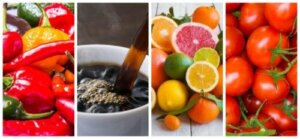

Written and verified by the doctor José Gerardo Rosciano Paganelli
An overactive bladder can let out urine at any moment without the slightest notice. It’s a problem that can be more than annoying. However, the good news that its one that we can solve if we treat it early and correctly.
In this article, we’ll look at the foods you should avoid if you’re hoping to deal with this problem.
What you need to know about an overactive bladder
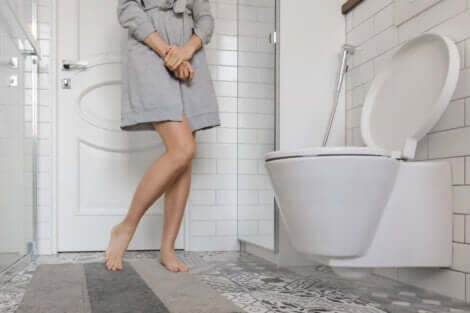
Before looking at how to deal with the problem, it’s a good idea to know a bit about an overactive bladder, also known as “hyperactive bladder”. Someone who suffers from two or more of the following symptoms may well be a sufferer:
- Urinates more than eight times a day and twice at night (without having drunk excessive amounts of liquid).
- Strong, repetitive urges to go to the bathroom.
- Loss of fluid after urinating.
More common causes
Several different causes may be to blame for a loss of bladder control. However, although the following typically the principal culprits:
- Nerves.
- Stress.
- Excessive coffee consumption.
- Drinking very large amounts of water.
What’s more, around 20% of cases correspond to a neurological condition such as Parkinson’s disease, brain tumors, or spina bifida.
People who suffer from a hyperactive bladder may end up feeling unable to take part in certain activities. Similarly, they may have feelings of shame about their condition.
The sudden need to go to the bathroom and urine leakage “on the way” can cause social isolation and problems at work. After all, it’s likely that the sufferer will end up dedicating a lot of mental energy to worrying about the problem.
Foods and drinks to avoid if you have an overactive bladder
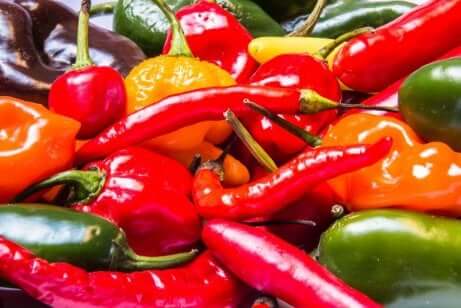
Various treatments are available for this condition and vary depending on the case. Thus, not all patients get the same treatment.
- Some are prescribed by a medical professional, such as a botox injection.
- Others are related to daily habits. These include physical exercises to strengthen the pelvic floor and a diet that cuts down on certain drinks and infusions.
If you’re one of the many people who suffer from a hyperactive bladder, we suggest that you avoid the following foods, as they may worsen the problem and cause more discomfort:
1. Spicy foods
Indian sauces, Mexican dishes, Asian foods, hot chili… They can be delicious, but they can also cause problems when it comes to the health of your urinary system. Just think: if eating them makes your mouth burn, won’t they do just the same to the lining of the bladder? The answer is yes!
Spicy foods and condiments will worsen the symptoms of the condition. That’s why we recommend that you avoid them altogether or reduce the amount you use when preparing meals.
2. Sugary foods
Artificial sweeteners increase the urge to urinate and irritate the bladder, as well as adding extra calories to your body. Therefore, avoid adding them to your drinks and be sure to read the labels of different food products (cookies, cakes, candies, cereals, etc.) to avoid consuming them. Instead, eat more fruits and nuts, which are healthy and nutritious.
3. Tomatoes
Tomatoes are a very acidic fruit. That’s why they have a potentially harmful effect on the health of the bladder and the urinary tract. What’s more, they contain a large quantity of water and have a strong diuretic effect.
If you’re eating a cooked tomato, it’s even worse, especially if the tomato is consumed in the form of a sauce. This is because many people add sugar to tomato sauces to “mask” the slightly acidic taste. As we discussed above, sugary foods aren’t advisable for people with incontinence.
A great technique for making delicious sauces with a lower sugar content is to add raw grated carrot. You could also try adding a small amount of cream, milk, or even baking soda to the mixture. All of these will help counteract the natural acidity of the tomato.
4. Coffee
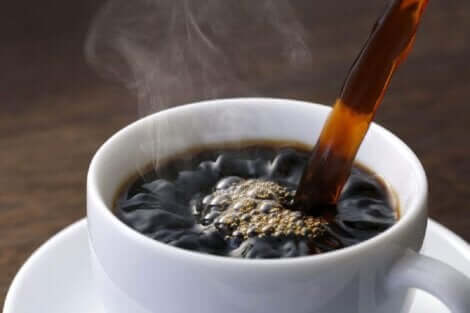
Caffeine has several negative effects on the body that are worth highlighting. For example, it causes hyperactivity of the brain, heart, and bladder.
That’s why drinking too much coffee makes the bladder overwork. Then, this exacerbates the symptoms of a hyperactive bladder. However, coffee isn’t the only common drink that can increase the amount of urine the bladder has to expel on a daily basis. In addition, soft drinks (especially colas), certain types of tea, and hot cocoa are also culprits.
4. Blueberry or citrus juices
There’s no doubt that blueberries are great for the health of your blood and heart. Plus, they’re highly recommended for people suffering from hypertension and diabetes. What’s more, they’re a great tool for fighting urinary tract infections.
However, one of the side effects that they can have is exacerbating the symptoms of a hyperactive bladder. The acid contained in these little berries makes us need more frequent trips to the bathroom.
In addition, you should also avoid citric or acidic drinks like orange juice and grapefruit juice, etc, even though their high vitamin C content makes them great at boosting the immune system.
For those who suffer from urinary incontinence, these fruits further irritate the bladder.
6. Alcoholic beverages are the worst for for overactive bladder
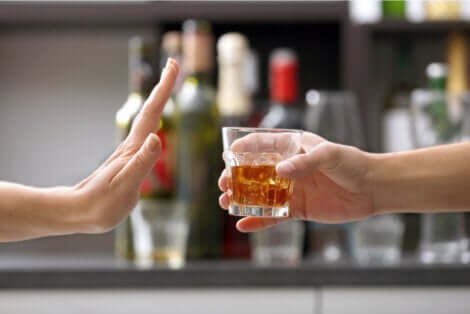
There are many health consequences of drinking alcohol (especially in excess). As it’s a powerful diuretic, it can irritate the bladder.
For example, every time you drink a beer, you’re obviously ingesting liquid. However, at the same time, the alcohol contained in the beer speeds up the work of the kidneys, meaning the bladder has to work faster to expel the liquid.
This article may interest you: The Causes of Alcoholism: Consequences and Treatment
Avoid these foods and follow your doctor’s instructions
Remember that if you suffer from this problem and you feel discomfort in your daily life, you should go to the doctor and follow their instructions. Only a professional can help you find the best treatment.
All cited sources were thoroughly reviewed by our team to ensure their quality, reliability, currency, and validity. The bibliography of this article was considered reliable and of academic or scientific accuracy.
- Eduardo Martínez, A., José, L., Ruiz, C., Luis Gómez, P., Miguel Ramírez, B., Francisco Delgado, O., … de Estudio Cooperativo, G. (2009). Prevalencia de incontinencia urinaria y vejiga hiperactiva en la población española: Resultados del estudio EPICC. Actas Urológicas Españolas. https://doi.org/10.1016/S0210-4806(09)74117-8
- Perales Cabanas, L., & Jiménez Cidre, M. (2002). Vejiga hiperactiva. Archivos Espanoles de Urologia.
- Castro, D., Espuña, M., Prieto, M., & Badia, X. (2005). Prevalencia de vejiga hiperactiva en España: Estudio poblacional. Archivos Espanoles de Urologia. https://doi.org/10.4321/S0004-06142005000200006
This text is provided for informational purposes only and does not replace consultation with a professional. If in doubt, consult your specialist.








